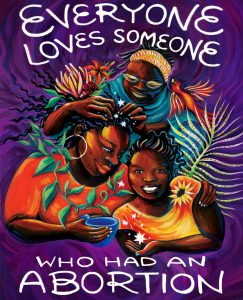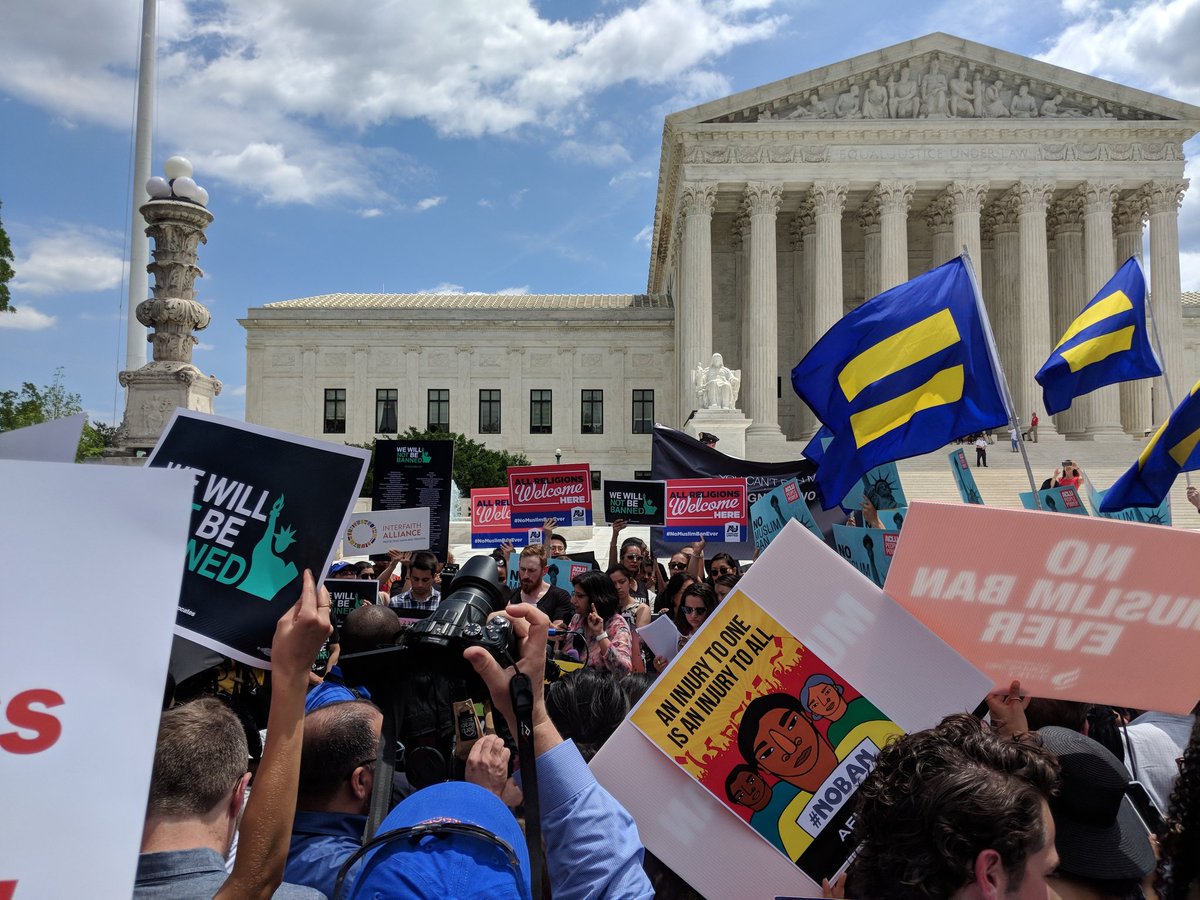It’s hard to imagine a just and equitable world that doesn’t allow for people to have full control over decisions related to their body. Yet, after this week, there is no doubt that we are on the precipice of what reproductive justice organizers have been warning us for decades.
Many Americans are waking up shocked. But the writing has been plastered on the wall in permanent ink for a while. According to the New York Times, over 100 anti-abortion bills that restrict or ban abortions were passed in 19 states” in 2021. 2022 was turning out to be no better, with 33 restrictions in 9 states having been enacted and over 500 restrictions introduced so far this year.
Regardless of how the final epitaph reads, judicial conservatives have made it clear that we were in the midst of witnessing the end of Roe v. Wade as we know it. As a result, reproductive justice advocates and practitioners will need all kinds of support, way more than the little that has been given to them in the past.
How much is that? According to research assembled by the National Committee on Responsive Philanthropy (NCRP), between 2015 and 2019 only $1.7 billion dollars was designated specifically for reproductive rights. Of those limited funds, only 21% or $361 million was explicitly designated for abortion rights and services. That might sound like a lot, but really isn’t when you consider that in 2019 alone, foundation giving in the US totaled $76 billion.
So what can you do if your foundation’s grantmaking falls outside of this issue area? Actually, a lot.

“Everyone Loves Someone Who Has Had An Abortion” Art created by Kenya Martin, Jasmine Burnett and Micah Bazant as a collaboration between National Network of Abortion Funds and Forward Together.
What about our funding strategy?
Like most foundations, the Butler Family Fund has an overarching strategy for our grantmaking. It involves supporting Black Indigenous and People of Color (BIPOC)-led community-based organizations working at the intersection of Housing Justice and Criminal Legal Reform. So, like many of my foundation colleagues, I wondered how our organization could respond when reproductive justice and abortion access aren’t a part of our funding strategy. What options are available when we’re already focused on our grantmaking for the upcoming docket? Quarter? Year?
In the short term, we can be creative with how we partner with our trustees to provide support for work that overlaps with our funding strategies. Last summer, as news of the draconian anti-abortion law in Texas was ratcheting up, one of my trustees reached out and asked what we could do and if I could suggest any groups for her Board discretionary grant. Thanks to the amazing work of organizations like Groundswell and Funders for Justice, I was able to quickly assemble a list of potential organizations from which she could choose from. She eventually selected one of the many abortion access funds focused on supporting safe travel and care for people seeking abortions.
In the long term, we can engage in conversations with our trustees that may help us build the support we need for more deeply integrating intersectional approaches into our institutional strategies.
According to Exponent Philanthropy 36% of foundations in a recent survey said that they made discretionary grants. The National Center for Family Philanthropy (NCFP) reported that 64% of its members have discretionary grants. Unfortunately, there isn’t consistent data on the number of foundations offering a matching grant opportunity to their staff or the total amount of discretionary giving as a percentage of overall foundation giving. Foundation Source outlines the pros and cons of discretionary grantmaking.
Discretionary means “at the discretion of the user,” right?
Like many foundations, the guidelines for our discretionary grants are relatively broad to allow trustees to support a range of personal interests. Even with this considerable leeway, over the past four years, more than 50% of our Board’s discretionary grants have been awarded to work that is complementary and intersects just beyond our guidelines. As foundation leaders, we have the opportunity to use the urgency of this era and the scale of the threats we face. These are just some new ways that we can partner with our trustees:
Be supportive. While discretionary is at the user’s behest, it doesn’t have to happen in isolation. As foundation leaders and staff, we often have ongoing communication with our Board members. Over time, as we learn more about our trustee’s discretionary interests, we can look for connections to our broader grantee networks. We can also encourage trustees to reach out when they are troubled by the state of the world, and use our colleagues and networks to identify groups they may not otherwise learn about.
Connect the dots. Our grantees don’t lead single-issue lives. We often learn much more about their work than what we share with our Boards. We can add a footnote to a grant recommendation, talking point to our presentation, or general observation in our leadership reports about the intersections we’re observing between climate change and reproductive justice or childhood poverty and reproductive justice. We can be more explicit about how our funding recommendations overlap with emerging issues and time-sensitive requests (e.g., abortion access, climate disaster relief, migration crisis).
Color outside the lines. Sometimes, even when we look for the connections between our strategy and emerging issues, it isn’t immediately visible. In those moments, be flexible and focus on helping trustees direct their funds towards funding community-led movements for social justice. While we know organizing and movement work is transformative, there remains a significant gap between funding for white-led organizations and BIPOC-led organizations, especially those led by women, trans, and gender-expansive leaders. Supporting movements and BIPOC leaders will have an impact, even when it’s outside of your defined mission or strategy.
Expand the choir. A concise and accessible set of rapid response or discretionary giving recommendations can help individuals learn about BIPOC-led and other often overlooked community-led efforts. When preparing grant suggestions for an individual board member, consider sharing them with the full board. And, make it easy to forward as an email to friends and family, or consider creating a sample email or easily shareable links for social media.
Partner with others. While we continue learning to make deeper personal and organizational connections at the intersection of movements for social justice, it’s OK to jump in and make grants while we learn. The Butler Family Fund is planning a pilot project where we will encourage trustees to use JustFund’s Find and Fund feature to award their upcoming round of discretionary grants. JustFund is the only nonprofit grantmaking solution created by funders and organizers of color, to remove traditional barriers that prevent grantmakers from moving resources efficiently to organizations at the forefront of social change. We’re excited to introduce our trustees to thousands of social justice organizations in an easy-to-use filter format (i.e. focus areas, geographic regions, strategies).
Where Should I Start?
This is the time to finally head the calls for bold commitments and funding of frontline organizers. Abortion access and everything that falls under what we consider reproductive rights are inexorably intertwined with what we as foundations do with issues like economic justice, racial justice, immigrant rights and health equity. The urgency of the current moment makes direct, short-term responses very important to local advocates on the ground.
To help you get started, here are a few organizations that you can direct resources and other supportive efforts:
Florida Access Network: An abortion fund that fosters community care and collective liberation by relieving barriers and reducing stigma to accessing abortion and reproductive healthcare in Florida.
Kentucky Health Justice Network: KHJN is an abortion fund that supports Kentuckians towards achieving autonomy in our lives and justice for our communities. They advocate, educate, and provide direct services to ensure all Kentucky communities and individuals have power, access, and resources to be healthy and have agency over our lives.
Feminist Women’s Health Center: A Georgia-based, independent abortion clinic that provides a range of healthcare services and are committed to making our services safe and welcoming to the LGBTQIA+ community. Through community education, grassroots organizing, and advocacy programs they work to advance reproductive health, rights, and justice.
Indigenous Women Rising: A national abortion fund committed to honoring Native & Indigenous People’s inherent right to equitable and culturally safe health options through accessible health education, resources, and advocacy
Abortion Fund of Arizona: An abortion fund that provides direct assistance to people seeking abortion care in Arizona.The Arizona Abortion Fund helps offset the cost of a safe/legal abortion for those who can’t afford it.
CHOICES Memphis Center for Reproductive Health: An independent clinic that offers comprehensive reproductive health care to everyone. They provide affirming health care services to everyone all—even if they can’t afford the full cost of the services they need.
Desert Star Institute for Family Planning: An independent abortion clinic in Arizona providing access to the full range of just, dignified, and exceptional reproductive health care to people who can become pregnant regardless of circumstance or zip code.
The Brigid Alliance: The Brigid Alliance arranges and funds confidential, personalized travel support to those seeking abortion care in increasingly hostile environments.
Buckle Bunnies Fund: A Texas based abortion fund led by unpaid volunteers who are dedicated to the autonomy of abortion seekers, not just in Texas, but everywhere.
Midwest Access Coalition: As a practical abortion fund, MAC helps people traveling to, from, and within the Midwest access a safe abortion by assisting with travel coordination and costs, lodging, food, medicine, childcare, and emotional support.
Molly Schultz Hafid is Executive Director of the Butler Family Fund. She serves as Treasurer of the Board for the National Committee for Responsive Philanthropy and as the Chair of the Board for JustFund.
Brandi Collins-Calhoun is a Movement Engagement Manager at the National Committee for Responsive Philanthropy (NCRP). A writer, educator and reproductive justice organizer, she leads the organization’s Reproductive Access and Gendered Violence portfolio of work.























































































































































































































































































































































































































Leave a Reply